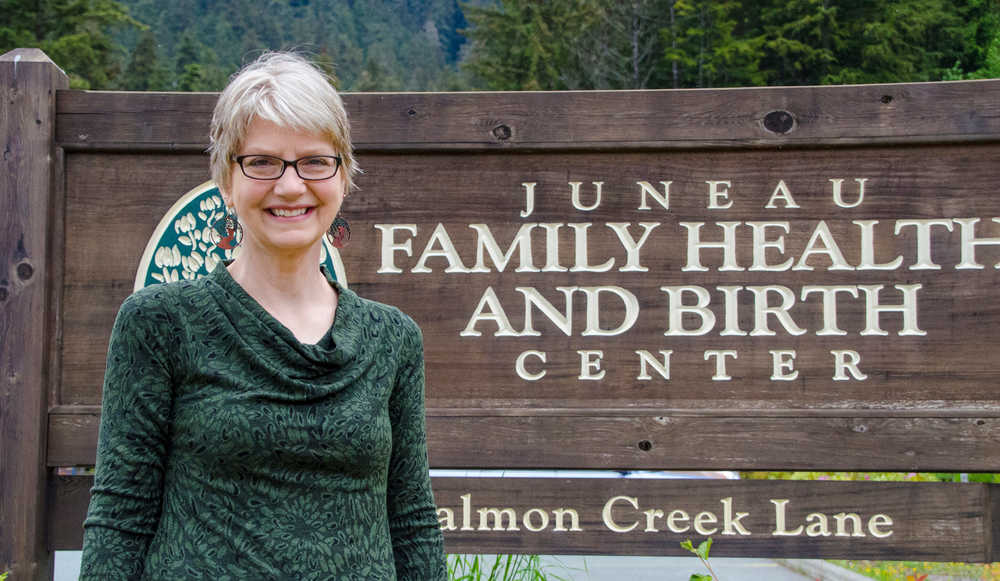JUNEAU — Kaye Kanne can be considered the mother of midwifery in Alaska. From founding the Juneau Family Health and Birth Center to successfully lobbying midwifery legislation into law, she has given thousands of women in Juneau and other Southeast communities something that was never available before, the option of alternative birthing methods.
After practicing midwifery for three decades, attending more than 1,000 births and opening the JFHBC in Juneau, Kanne retired from the birth center in April to focus on her work at the national level, which she has also been doing for the past 22 years.
“When I ended up moving to Juneau in 1984, I had attended 200 births by then, but I hadn’t been practicing on my own,” Kanne said. “There was no licensing in Alaska, so I immediately got involved in that. It took eight years to get a midwifery board. The first board got the law passed in 1992, so there could be midwives in Alaska.”
Kanne served on that board, the Certified Direct-Entry Midwife Licensing Board, from its inception until her term limit was met in 2000. During that time, she “served as chair and helped craft the laws the govern CDM in Alaska today,” according to the JFHBC website.
During that time, as a practicing midwife, Kanne founded what is now known as the Juneau Family Health and Birth Center based on feedback from her clients.
“(As a midwife, I knew a) group of parents that really wanted to see a birth center in Juneau,” Kanne said. “So many women would really have liked to have a midwife, but didn’t feel comfortable having a home birth.”
Acting as “volunteer architect, contractor and laborer,” Kanne and 70 volunteers built the original, nonprofit Juneau Birth Center in rented space in 1998. But as the need for expanding services became more apparent, Kanne began fundraising to build a new facility.
“I raised the $3.9 million needed for this new facility over six years, while serving as executive director and midwife. Funding came from federal, state and city appropriations as well as foundations, businesses and individuals,” Kanne wrote on the National Association of Certified Professional Midwives website.
The new facility opened in 2008 and took on the now familiar moniker, but with expanded services — ones that were not offered at the original Juneau Birth Center.
“(We) expanded (our) vision to include healthcare and provide a lot more family services,” Kanne said of the new facility.
Since the opening of the birth center in 1998, the center has seen 60 to 80 births per year, including home births and transports. Kanne alone has attended more than her fair share.
“I have personally attended more than 1,000 births,” she said. “I lost count a few years ago when I hit 1,000. I should really go back through and check on that.”
Though Kanne retired from the JFHBC, she will continue to be a part of the Juneau midwifery community, and continue to advocate for stronger regulations on the national level.
“I’ll continue my education and stay a midwife,” Kanne said, “but I just can’t have a full-time job. I was executive director, the birth center director, a midwife, I just couldn’t get it down to one job. I just need to let go of this job and do my own work . Starting a nonprofit so that I could eventually leave it and it would continue as part of the community has always been my vision.”
Diana Rossmiller, a founding member of the JFHBC and former patient of Kanne, agreed that “what she has created has grown so much bigger than her and has grown beyond her. I know that she will be missed in her position as a founding member and director, but I do think that the organization is really solid and will continue thriving in her absence.”
Most of the midwives that continue to work at the JFHBC were students of Kanne. And while she may not be present, her knowledge and years of experience have been passed down to a new generation of midwives, most of which can attribute their career to her lifelong work.
As for Kanne’s work in the future, she currently serves on several national boards, including the National Association for Certified Professional Midwives, an association that aims to create licensing in every state, where there are “probably 17 states that don’t license and there are midwives still going to jail for what they do,” Kanne said.
She also serves as the treasurer of the Commission for Accreditation of Birth Centers, to make accreditation a mandatory policy rather than a voluntary one. And the United States Midwifery Education, Regulation and Association, a group of midwives that “work toward the common goal toward national promotion of midwifery.” Including consulting businesses and helping midwives start birth center foundations.
Dawn Jouppi, a former patient of Kanne’s who had all three of her children either at the birth center or using a midwife for a home birth, described Kanne as being “an asset to Juneau.”
“She opened up the door to midwifery here,” Jouppi said. “And we have a thriving community of midwives here that do great work all over Southeast. We have midwives that fly to help people in other communities, and people from other communities that fly here to give birth at the birthing center. So I think that says something, that people want to come here, and have that experience in Juneau. And not every community has that, not even in big cities sometimes, so we’re special.”

